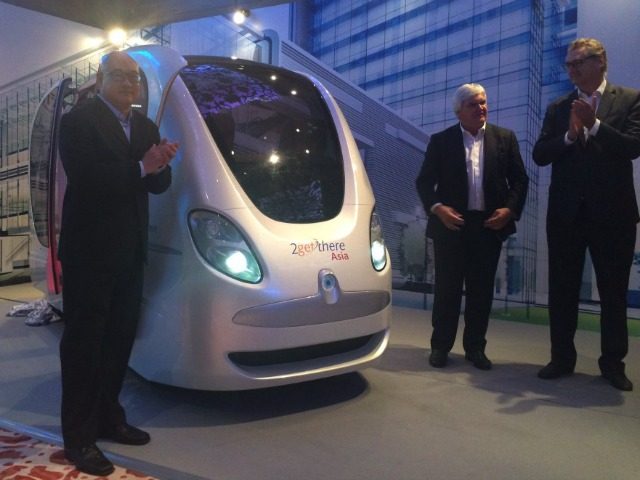While lawsuits pile up for ride-sharing companies, a Singapore-based joint venture plans to roll out 24-passenger driverless pods by the end of 2016.
The 3rd generation of the pods, called Group Rapid Transit vehicles, is the product of a collaboration between Singapore’s second-largest public transportation company, SMRT, and a technology and transportation company based in the Netherlands. The Singapore-based joint venture, known as 2getthere, issued a press release on Wednesday about the new initiative.
Carel van Helsdingen, Chairman and founder of 2getthere and SMRT Services Managing Director Colin Lim made the announcement together. “Building on decades of technological development and experience gathered through projects implemented worldwide, our innovative technology will be able to optimize the efficiency, reliability, and safety of transport networks,” said Helsdingen. “There is a growing national push to implement future mobility solutions,” added Lim.
The futuristic driverless pods will be able to carry 24 passengers a piece, with an expectation of 8,000 passengers per hour in any single direction. While unable to traverse on public roads, the pods will be utilized in “semi-controlled” environments such as university campuses and gated communities.
Capable of being ordered on-demand, they operate in any weather condition using various cameras, sensors, and GPS, as well as “artificial landmarks” to navigate. “The [pods’] system basically operates as a horizontal elevator,” the company said. “The vehicles will stop at every station selected as a destination and where transport has been requested.”
Singapore has been using earlier generations of the GRTs since 2010 and reached its “millionth customer” milestone in 2014. 2getthere currently operates smaller versions of the autonomous pods to transport up to 2,500 citizens each day within business parks in both Abu Dhabi and Rotterdam.
But 2getthere is not embracing the technology alone. Last year the European Union funded Citymobil2, a pilot program for automated transportation systems. Electric driverless vehicles such as the EZ10, WEpod, Robot Taxi — which Japan plans to commercialize before hosting the Olympics in 2020 — and even driverless buses are currently used worldwide in Finland, Japan, Greece, and Switzerland. By the end of this year, the autonomous vehicles will roll out in Northern California as well.

COMMENTS
Please let us know if you're having issues with commenting.